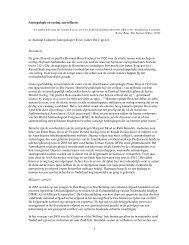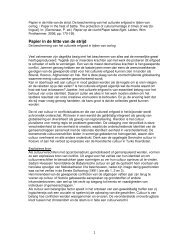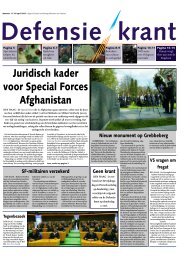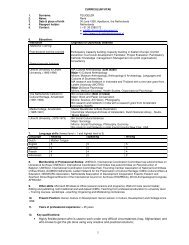The whole publication in PDF - Culture in Development
The whole publication in PDF - Culture in Development
The whole publication in PDF - Culture in Development
You also want an ePaper? Increase the reach of your titles
YUMPU automatically turns print PDFs into web optimized ePapers that Google loves.
countries from several UNESCO programmes as well as from other UN sources (e.g. UNDP, United Nations<br />
<strong>Development</strong> Programm e). It is good to know that almost every country has its own loc al UNE SCO library.<br />
1.7.1.1 RAMP<br />
In order to meet the needs of member states <strong>in</strong> the specialised area of archive adm<strong>in</strong>istra-tion and records<br />
management particularly <strong>in</strong> develop<strong>in</strong>g countries, the Division of the General Information Programme of UNESCO<br />
established a long-term Records and Archives Management Programme (RAMP) <strong>in</strong> 1979. <strong>The</strong> basic elements of<br />
RAMP reflect and co ntribute to the o verall themes of the General Information Program. RAMP thus <strong>in</strong>cludes<br />
projects, studies and other activities. UNESCO regularly publishes specialist studies and guidel<strong>in</strong>es on records and<br />
archives management (RAMP studies), which cover basic issues of record s and archives management such as:<br />
• archival <strong>in</strong>frastructure development <strong>in</strong>clud<strong>in</strong>g archival legislation;<br />
• tra<strong>in</strong><strong>in</strong>g and education;<br />
• protection of the archival heritage;<br />
• promotion of the development and application of modern <strong>in</strong>formation;<br />
• research <strong>in</strong> archival theory and practice.<br />
<strong>The</strong> majority of the studies, ma<strong>in</strong>ly those published after 1996 are available on-l<strong>in</strong>e. For older <strong>publication</strong>s on<br />
archives by UNESCO, or published with their assistance, see Evans, 1983. <strong>The</strong> drawback is that the specialist<br />
<strong>publication</strong>s are very quickly outdated.<br />
1.7.1.2 Museum International<br />
An <strong>in</strong>terest<strong>in</strong>g UN ESCO <strong>publication</strong> is the quarterly Museum published s<strong>in</strong>ce 1948. In 1992 it changed its name to<br />
Museum International and is now published <strong>in</strong> five languages (Arabic, English, French, Russian and Spanish). It<br />
is a must for those who want to keep abreast of the many aspects of museum life all around the world. Each issue<br />
features a theme of particular <strong>in</strong>terest e.g. Museum, 1987 (156): Staff tra<strong>in</strong><strong>in</strong>g and many an issue is dedicated to<br />
conservation e.g. Museum, 1982 (34/1) or to museums of a particular develop<strong>in</strong>g country or region e.g. Museum,<br />
1976 (28/4): Africa . <strong>The</strong> magaz<strong>in</strong>e provides a clear<strong>in</strong>ghouse for the exchange of views through case studies, on-site<br />
reports, <strong>in</strong>terviews, and <strong>in</strong>formed editorial commentary. For further <strong>in</strong>formation see the UNESCO-website.<br />
1.7.1.3 Memo ry of the World<br />
In 1993 UNESCO <strong>in</strong>itiated the Memory of the World programme. Documentary heritage reflects the diversity of<br />
languages, peoples and cultures. It is the mirror of the world and its memory. But this memory is fragile. Every day,<br />
irreplaceable parts of this memory disappear forever. UNESCO has launched this programme to guard aga<strong>in</strong>st<br />
collective amnesia call<strong>in</strong>g upon the preservation of the valuable archive hold<strong>in</strong>gs and library collections all over the<br />
world ensur<strong>in</strong>g their wide dissem<strong>in</strong>ation. <strong>The</strong> objectives of the programme <strong>in</strong>volve preservation by the most<br />
approp riate techniques, access without discrim<strong>in</strong>ation and the distribution of the results to the widest possib le public<br />
(see also Ornager, 2000).<br />
1.7.2 ICA<br />
<strong>The</strong> International Council on Archives (ICA), as the <strong>in</strong>ternational professional organisation, is co ncerned with all<br />
aspects of the management of records and archives throughout their life-cyle. Where UNESCO provides funds for<br />
<strong>in</strong>ternational development, ICA supplies the bra<strong>in</strong>s and muscles. Its general objectives are to encourage and support<br />
the development of archives <strong>in</strong> all countries, so as to preserve the archival heritage of mank<strong>in</strong>d; to promote, organise<br />
and coord<strong>in</strong>ate, on the <strong>in</strong>ternational level, activities <strong>in</strong> the field of records and archives m anagement; to establish,<br />
ma<strong>in</strong>ta<strong>in</strong> and strengthen relations between archivists of all countries and between all <strong>in</strong>stitutions, professional bodies<br />
and other organisations; and to facilitate the <strong>in</strong>terpretation and use of archival documents by m ak<strong>in</strong>g their contents<br />
more widely known and by encourag<strong>in</strong>g greater ease of access to them. To facilitate its work throughout the world<br />
ICA has established regional branches <strong>in</strong> the non-European regions. Each of these ten regional offices controls its<br />
own affairs and publishes its own jo urnal. <strong>The</strong> earliest branch (1968) was SARBICA, the ICA Regional Branch for<br />
Southeast Asia.<br />
Broad issues of professional concern are discussed every four years at the International Congresses on Archives,<br />
which <strong>in</strong>corporate open meet<strong>in</strong>gs of ICA sections and committees as well as plenary sessions and bus<strong>in</strong>ess meet<strong>in</strong>gs.<br />
In 1975, follow<strong>in</strong>g a gene ral conference held <strong>in</strong> D akar (Senegal), ICA established an International Archival<br />
<strong>Development</strong> Fund (FIDA) to provide top-up aid to archives <strong>in</strong> develop<strong>in</strong>g countries. Together with UNESCO ICA<br />
established the International Microfilm<strong>in</strong>g Programme for Develop<strong>in</strong>g Countries to assist national libraries <strong>in</strong><br />
exchange or purchase of microfilm copies. ICA also facilitates the dissem<strong>in</strong>ation of professional and technical good<br />
practice through <strong>publication</strong>s like the journal Comma (a merger of Archivum, Janus, and CITRA-proceed<strong>in</strong>gs) and<br />
their series of Studies.<br />
1.7.3 IFLA-PAC<br />
<strong>The</strong> International Federation of Library Associations and Institutions (IFLA) is a worldwide, <strong>in</strong>dependent, nongovernment<br />
organisation with a membership of 1,300 <strong>in</strong> more than 130 countries. Its members are library and related<br />
associations, libraries and similar <strong>in</strong>stitutions, <strong>in</strong>stitutional affiliates, and <strong>in</strong>dividuals. Its aims are to promote<br />
<strong>in</strong>ternational cooperation, discussion, and research <strong>in</strong> all fields of library activity. It considers all aspects of library<br />
work to be with<strong>in</strong> its prov<strong>in</strong>ce and strives to extend its membership to all countries. IFLA has a complex<br />
organisational structure with, amongst others, five Core Programs, one be<strong>in</strong>g the Preservation and Conservation<br />
(PAC) Core Program.<br />
Unlike other Core Programs the IFLA-PAC Programme operates from a number of national libraries. <strong>The</strong><br />
International Focal Po <strong>in</strong>t is at the Bibliothèque Nationale <strong>in</strong> Paris, France and there are six Regional Centres. <strong>The</strong><br />
programme has one major goal to ensure that library and archival materials, pub lished and unpublished , <strong>in</strong> all






